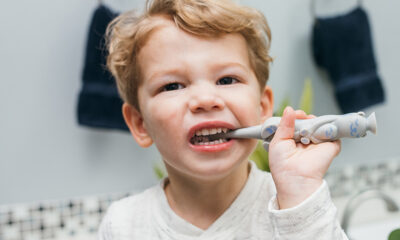Advice
A guide for the science-minded parent

Permissive parenting seems to be the “no discipline” approach to discipline. Does it damage kids? Threaten to destroy civilization?

The research suggests that permissiveness isn’t the best approach to parenting — at least not in places like the United States. But much as we might get annoyed by parents who let their kids disrupt other people’s lives, it’s not clear that everyone labeled as “permissive” is doing their children — or their neighbors — a disservice.
As you might expect, it depends on how you define “permissive.” Being warm and emotionally responsive to children doesn’t make you “permissive,” and it certainly doesn’t make you a bad parent. On the contrary, studies link sensitive, responsive parenting with secure attachments and fewer behavior problems.
The official, psychological definition of permissiveness concerns parental control. Are permissive parents too lax? What criteria must parents meet to be labeled “permissive?”
Here is an overview of permissive parenting: How researchers define it, how researchers screen for it, and what studies really say about the effects of an indulgent parenting style. As I’ll argue below, we need to be wary of painting all forms of permissiveness with a broad brush. It’s likely that some forms of permissiveness don’t cause any substantial harm, and might benefit children in a big way.
The textbook definition of the permissive parenting style
Permissive parenting, sometimes called “indulgent parenting,” is a style of child-rearing that features two key traits:
- being nurturing and warm (which is good for kids), and
- being reluctant to impose limits (which is problematic).
This definition derives from the work of Diana Baumrind, Eleanor Maccoby, and John Martin, researchers who developed a system for classifying parents according to the way they attempt to control their children’s behavior. According to these researchers,
- authoritative parents demand mature, responsible behavior from their kids, but they also encourage family discussion and critical thinking; and
- permissive parents—also called “indulgent” parents—reject the whole notion of keeping their kids under control.
As Baumrind notes, permissive parents share some similarities with authoritative parents. Both types of parent show high levels of warmth toward their children. They are emotionally supportive and responsive to their children’s needs and wishes—which is a good thing. Both types consult kids about policy decisions, which can be a good thing, too.
But, unlike authoritative parents, permissive parents aren’t demanding. They don’t assign their kids many responsibilities, and they don’t encourage kids to meet adult-imposed behavior standards. Instead, they allow—as much as possible—kids to regulate themselves.
Permissive parents don’t present themselves as authority figures or role models. They might use reason or manipulation to get what they want, but they avoid exercising overt power (Baumrind 1966). Psychologists often sum up these characteristics by saying that permissive parents exhibit “high responsiveness” and “low demandingness.”
A fourth parenting style—“uninvolved” parenting—is a bit like permissive parenting in that parents don’t enforce strict rules or standards of conduct. There is a lack of structure, a lack of boundaries. But the resemblance ends there. Permissive parents are warm and nurturing. Uninvolved parents are detached and emotionally disengaged (Maccoby and Martin 1983).
The positive and negative effects of permissive parenting
Does parenting style matter? It seems that way. Certainly, studies have reported significant links between specific parenting styles and child outcomes.
For instance, on the positive side, children with permissive parents are better off than kids whose parents are uninvolved. In addition, kids raised by permissive caregivers tend to have high self-esteem, and they may be more resourceful than kids raised by uninvolved or authoritarian parents (e.g., Turkel and Tezer 2008; Rothrauff et al 2009; Lamborn et al 1991).
But, on the negative side, there is also research supporting the claim that “indulged” kids tend to be less self-disciplined and less responsible than are children with authoritative parents.
For instance, when Jessica Piotrowski and her colleagues (2013) studied a nationally representative sample of more than 1000 young American kids, (ages 2-8), they evaluated children for deficits in self-regulation, the package of abilities that permits kids to control their impulses, stay focused, manage their moods, and execute plans.
What variables — demographic or social — were most highly correlated with poor self-regulation? By far, the most powerful predictor of problems was permissive parenting — i.e., having a parent who agreed with statements like, “I ignore my child’s bad behavior” and “I give in to my child when he/she causes a commotion about something.”
Similarly, a study of approximately 240 youngsters in China found links between permissiveness and children’s executive functioning (including working memory, cognitive flexibility, and the ability to inhibit inappropriate responses). Permissive parents were more likely to have kids who struggled to follow new (or counter-intuitive) rules (Qian et al 2024).
Of course, such correlations aren’t proof of causation. Maybe permissive parenting arises, in part, as a reaction to kids who show poor self-regulation. Parents can’t figure out how to handle this behavior, so they give up trying.
Nevertheless, the connection between permissiveness and behavior problems is concerning, and it has been reported in a number of behavioral domains:
- In some contexts, permissive parenting is associated with higher levels of aggression. For example, in studies of 8-year-olds, girls with high levels of negative emotionality were at greatest risk for aggressive behavior if their fathers were permissive (Pascual-Sagastizabal et al 2021). And the trend across studies is that kids with permissive parents tend to have higher levels of “externalizing” problems (such as aggression and disruptive behavior) relative to kids with authoritative parents (Pinquart 2017).
- Relative to authoritative parenting, permissive parenting has also been linked with higher childhood BMIs (Sokol et al 2017; Sleddens et al 2011).
- Other studies have found links between permissiveness and increased alcohol use among teenagers (e.g., Jackson et al 2021; Reimuller et al 2011; Weiss and Schwartz 1996; Lamborn et al 1991), as well as higher rates of school misconduct (Lamborn et al 1991).
- Studies suggest that kids from permissive homes spend more time watching television. For example, in the U.K., a study of 10- and 11-year-olds found that kids with permissive parents had 5 times the risk of watching more than 4 hours of television per day (Jago et al 2011). And in New Zealand, researchers report that 2-year-olds with permissive mothers logged more time watching television than kids with authoritative mothers (Howe et al 2017).
There’s also evidence that permissiveness is associated with problematic sleep.
In a review of the literature about children’s sleep difficulties, researchers found that both toddlers and young school kids were more likely to suffer from sleep problems if they had “lax or permissive” parents (Newton et al 2020).
Similarly, in a survey of parents with kids between the ages of 2 and 10, researchers documented links between permissiveness and the severity of sleep problems (Shetty et al 2022).
In what way might permissive parenting contribute to a child’s sleep problems? We know that bedtime routines can help kids develop healthy sleep patterns. We also know that children are at higher risk for sleep troubles if they use screens at bedtime. Thus, it isn’t hard to imagine how a lack of directiveness or supervision could lead kids into poor sleep-related habits.
What about academic achievement? Is permissive parenting associated with poor academic performance?
We’ve seen that permissiveness has been linked with self-regulation problems and sleep difficulties, so it wouldn’t be surprising if permissiveness was also associated with lower academic performance. After all, self-regulation and sleep play a role in our ability to succeed in the classroom.
Consistent with this suspicion, the overall pattern across studies is that kids from permissive families tend to show somewhat lower levels of academic performance (Pinquart 2016). But — overall — the effect size of parenting style on achievement is probably very small (Pinquart 2016).
And it’s important to understand that while academic outcomes are a bit worse for kids with permissive parents, this is true only if we are comparing them with children with authoritative parents. Kids from authoritarian families also tend to have worse academic outcomes, and, if anything, authoritarianism may have a more negative effect than permissiveness.
For example, in a study of academic performance of high school students in Pakistan, researchers found that kids from permissive homes performed slightly worse than kids from authoritative homes. But both of these styles were linked with substantially better academic outcomes than authoritarianism (Ali et al 2023).
As the study authors note, permissiveness didn’t have a significant impact on academic performance — not in cases where this parenting style amounted to merely ignoring “minor mischiefs and misbehavior” (Ali et al 2023).
So there is a pattern of better emotional well-being and somewhat worse self-regulation. But there are exceptions.
For example, indulgent parenting isn’t always linked with good emotional health.
A study of Palestinian Arabs found that boys with permissive parents were more likely to suffer from low self esteem, anxiety, and depression (Drairy 2004). Similarly, a study tracking American kids for over 10 years found that some children — preschoolers who were behaviorally inhibited — were more likely to develop anxiety and depression if they were raised by permissive parents (Williams et al 2009).
There is also some controversy about whether permissiveness is always inferior to authoritative parenting.
Several studies, conducted in Spain and Latin America, have reported no differences between teenagers raised by permissive or authoritative parents (e.g., Garcia and Gracia 2009). Indeed, for certain types of outcome, like self-esteem and self-perceived social competence, kids with permissive parents tend to turn out better (Villarejo et al 2024).
Why do different studies report conflicting results?
It may be that parenting styles have different effects depending on the local culture (Chao 1994). But it’s probably also a question of methodology. While most researchers cite Baumrind’s definition of permissive parenting, there are many ways to measure permissiveness. And, as I explain elsewhere, different measures can lead to different outcomes. So how do researchers measure permissive parenting? And what’s the most reliable, useful approach?
Identifying your parenting style: Are you permissive?
It’s easy to say that a permissive parenting isn’t “demanding.” But what does that really mean? “Demanding” is a subjective term. It’s vague.
So researchers need a set of objective criteria to diagnose a parent’s style. Very often, this means using questionnaires. People are asked to indicate how much they agree or disagree (on a scale of 1 to 4) with a series of statements, like
“I ignore my child’s bad behavior”
“I give in to my child when he or she causes a commotion about something”
“I bribe my child with rewards to get him to comply with my wishes”
The answers are tallied. The parent who gets the right score is labeled “permissive.”
That’s pretty straightforward, but there’s a catch: Researchers don’t always use the same questions, and the precise wording of questions can vary in important ways.
For example, take the Spanish research — the studies showing that kids with “indulgent” parents are thriving. These studies have relied on screening tools that aren’t typically used in English-speaking countries, and it makes a big difference. The Spanish studies have tended to classify parents as “indulgent” (and not authoritative) if they fall short of being highly directive or bossy. To see what I mean, consider this statement:
“My parents give me certain jobs to do and will not let me do anything else until they are done.”
If an adolescent disagrees with this statement, that’s grounds (in the Spanish studies) for classifying his parents as indulgent. But this is measuring something different than ignoring bad behavior, or “giving in” to a child who creates a commotion. It’s measuring how much you micromanage your adolescent’s activities.
If you allow your teen the autonomy to schedule his or her own tasks, does that really disqualify you from being “authoritative”? I don’t think it does — not if you are screened with the testing items typically used in English-speaking countries.
In support of the idea, Alfonso Osorio and Marta Gonzalez-Camara (2016) recently compared these methods directly: They tested the same teenagers using both screening tools. The results? Kids whose parents were classified as “indulgent” (using test items from previous Spanish research) were reclassified as “authoritative” (using test items from typical of English-speaking research).
So by using different screening tools, researchers are, in effect, defining “permissive” parenting differently. Is one definition better than the other? Not really. It doesn’t matter how we label people — not as long as we understand each other’s definitions.
I think the important takeaway from all studies is that “ignoring bad behavior” is generally linked with suboptimal child outcomes. By contrast, being very controlling — like insisting that a teenager do every task in a specific order — isn’t associated with the best child outcomes. In fact — as I note in another article — it’s probably detrimental.
And it’s worth noting: Even a statement like “I ignore my child’s bad behavior” is vague and subjective. What sort of bad behavior are we talking about? Hitting and biting? Leaving your socks on the floor? Dismantling an old toy? Defying gender stereotypes?
In defense of permissiveness
When I read Baumrind’s original model–proposed back in the 1960s–I’m struck by how moderate her permissive parents sound. It’s ironic, because her purpose was to refute the claims of permissive ideologues, and her arguments are persuasive.
Yet Baumrind’s permissive parents don’t sound like people who routinely let their kids get away with antisocial behavior — not, at any rate, behavior that I find objectionable, like deliberate rudeness, or violations of other people’s rights and feelings.
Instead, Baumrind’s permissive parents sound more like radical democrats. People who believe that parents and kids should exercise equal power.
Is this radical egalitarianism truly inferior to authoritative parenting? I wonder if the evidence against permissive parenting is really evidence against a relatively extreme, “anything goes” type of permissiveness.
For instance, consider a family where the kids are expected to be polite and helpful, but given a lot of leeway about other things, like the tidiness of their private spaces, the kinds of snacks they eat, or their bedtime arrangements. To controlling parents, these homes might seem very permissive. But the kids aren’t being given free reign. They’re being granted autonomy in a few, key areas. Will the kids be worse off for it?
Possibly, if the kids make consistently bad choices. Kids might end up eating too many nutrient-poor, energy-dense treats, for instance (Hennessy et al 2012). Or stay up too late at night. But if kids end up making mostly responsible choices, they may suffer little or no cost for their occasional lapses, and have learned important life lessons about self-regulation.
Moreover, it seems likely that certain kinds of permissiveness give kids a distinct advantage.
An international study conducted by Fernando Garcia and his colleagues suggests this. The adolescents who scored as being the
-

 Destination8 months ago
Destination8 months agoSingapore Airlines CEO set to join board of Air India, BA News, BA
-

 Breaking News10 months ago
Breaking News10 months agoCroatia to reintroduce compulsory military draft as regional tensions soar
-

 Gadgets3 months ago
Gadgets3 months agoSupernatural Season 16 Revival News, Cast, Plot and Release Date
-

 Tech News12 months ago
Tech News12 months agoBangladeshi police agents accused of selling citizens’ personal information on Telegram
-

 Productivity11 months ago
Productivity11 months agoHow Your Contact Center Can Become A Customer Engagement Center
-

 Gadgets3 weeks ago
Gadgets3 weeks agoFallout Season 2 Potential Release Date, Cast, Plot and News
-

 Breaking News10 months ago
Breaking News10 months agoBangladesh crisis: Refaat Ahmed sworn in as Bangladesh’s new chief justice
-

 Toys12 months ago
Toys12 months ago15 of the Best Trike & Tricycles Mums Recommend























